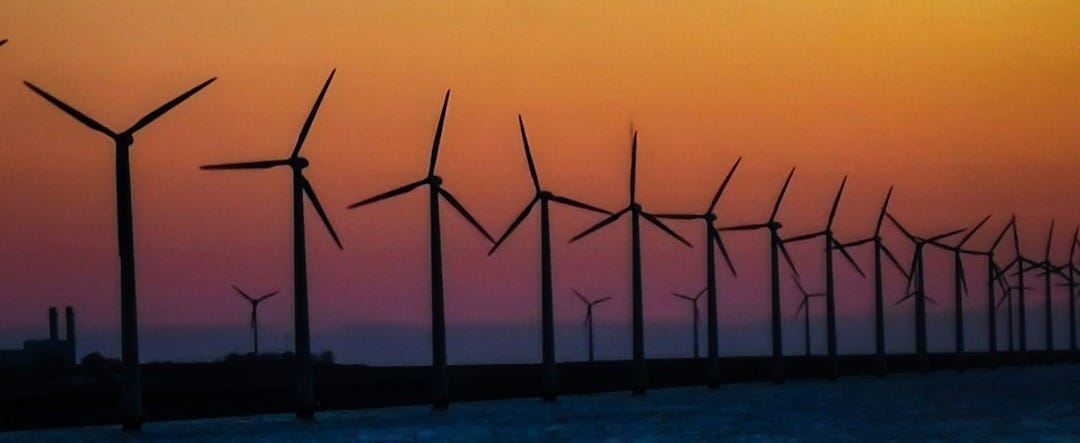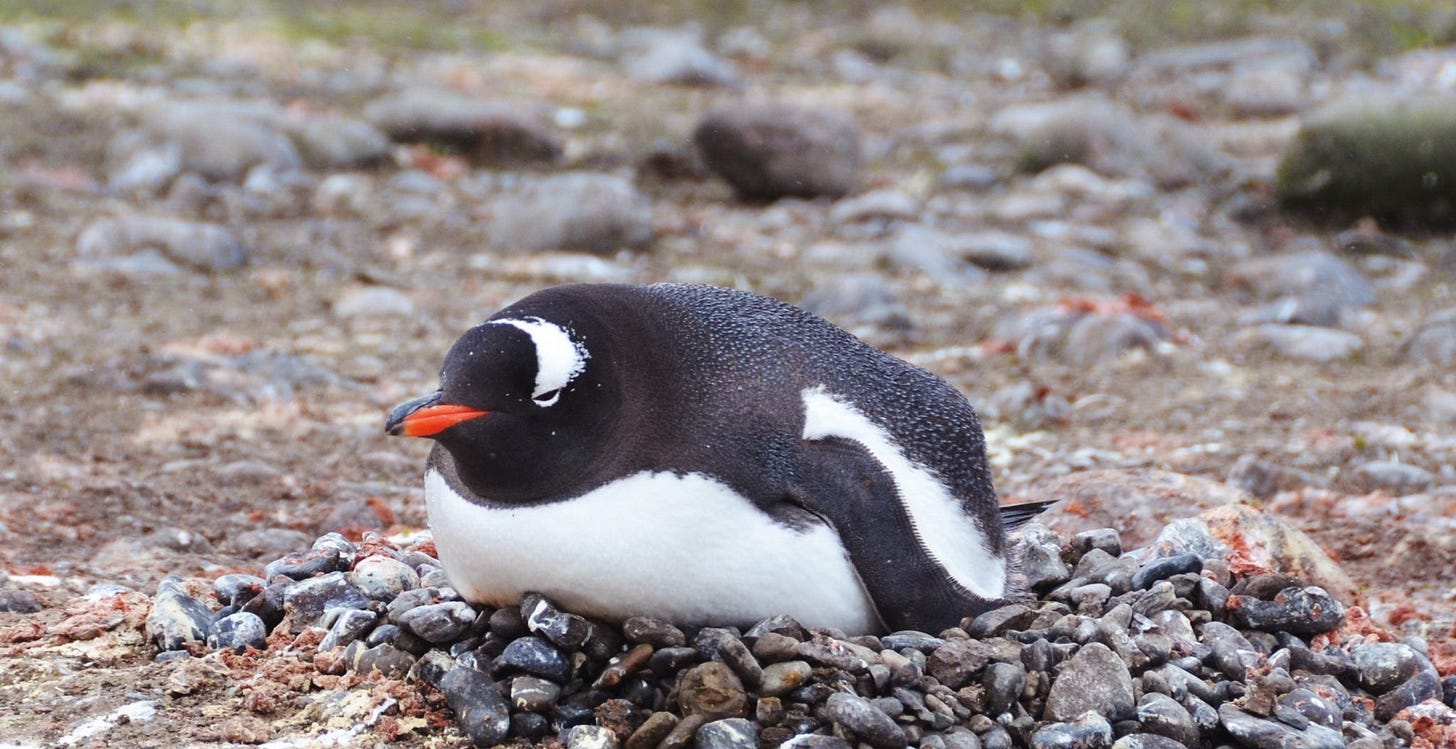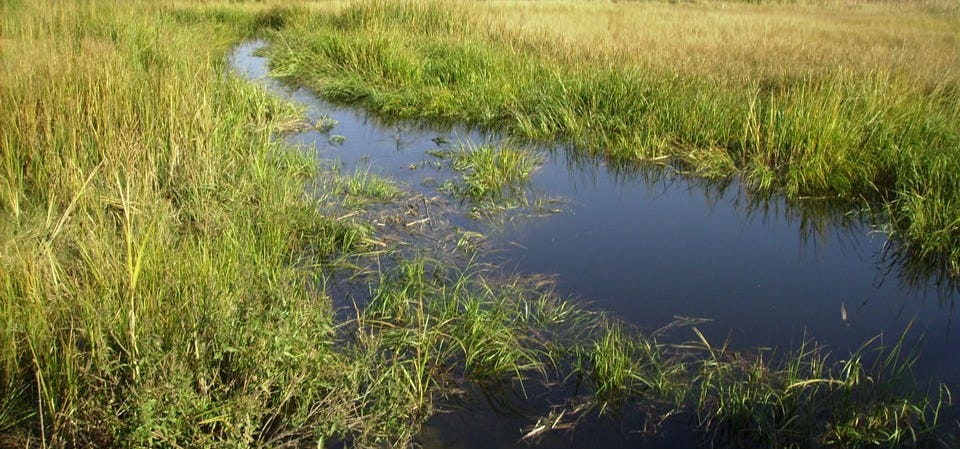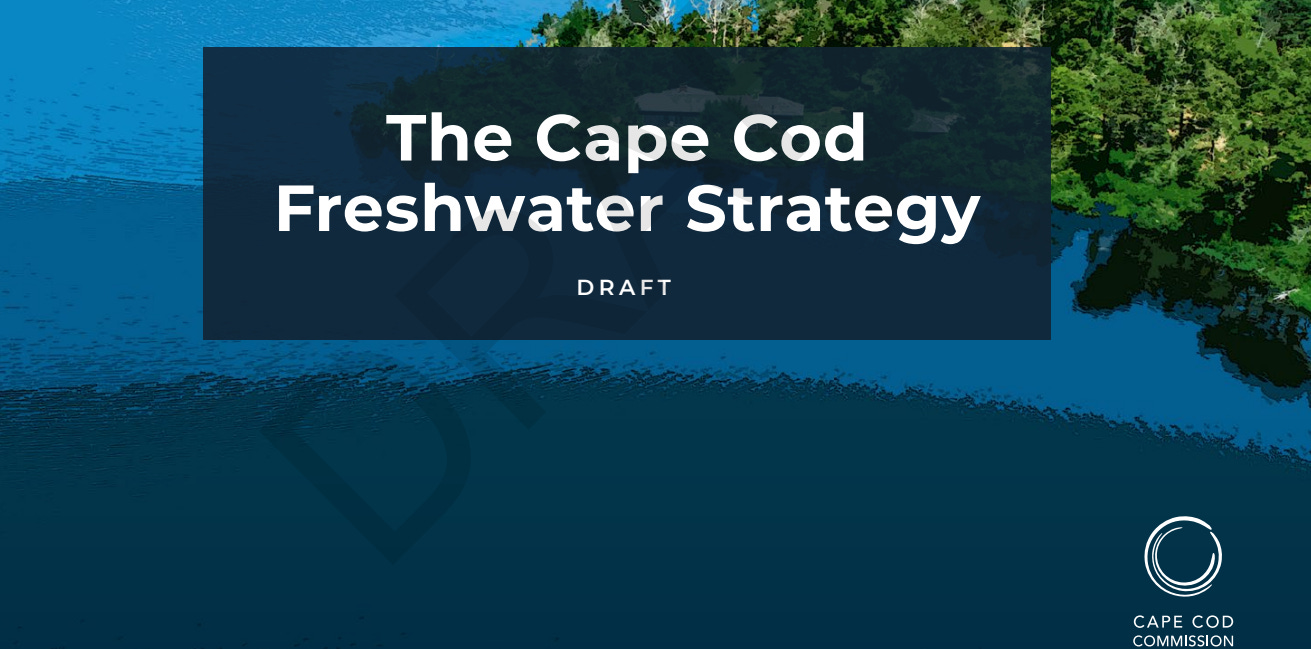Feb 14: Courtship tips from WHOI, more $ unfrozen, still targeting offshore wind
And 95% of countries blow the Paris Agreement deadline to submit new 5-year emissions-cutting plans
NOTE: The table of contents items below are linked to the articles, but this feature only works if you are reading the post in Substack while logged in - apologies for the inconvenience.
In this issue:
Cape & Islands
A glimmer of good news — federal funding unfrozen for APCC’s Cape restorations
Public comment time for the Cape Cod Commission’s draft Freshwater Strategy
Guess WHO(I) in Massachusetts ranked first in getting National Science Foundation funds in 2023?
Massachusetts
United States
International
Events and Activities
Virtual event, Feb 18, 7 pm: Marine Debris, Plastic Foam Collection & Pollution Prevention, Sierra Club’s Cape Cod & Islands Group hosts Laura Ludwig from the Center for Coastal Studies
In person events at the Center for Coastal Studies and Woodwell Climate Research Center coming up
Conservation Calendar — great outdoor and indoor activities this week
Cape & Islands
Five courtship tips from ocean lovers at WHOI
WHOI News, Brady Clarke, February 10, 2025
Puffer fish draw in the sand, penguins share rocks, and pygmy seahorses dance, and more. Check out the courtship tips, photos, and video here.
A glimmer of good news: some federal funds unfrozen for APCC’s restorations — this court order still mattered
According to a post by the Association to Protect Cape Cod (APCC), they were able to access the federal payment system and begin drawing down part of the almost $18M of federal funds obligated to them from NOAA for a series of marsh and cranberry bog restoration.
This unfreezing of funds is a clear indication that the court orders are meaningful. According to APCC, their access to funds was retored after a federal court ruled that the administration was out of compliance with an earlier court ruling.
However, APCC concludes, “While pleased to be able to be paid for work legally authorized, APCC remains concerned about the administration’s commitment to honoring these long-term project contracts and will proceed cautiously until the court and political proceedings play themselves out.”
Draft Cape Cod Freshwater Strategy from the Cape Cod Commission — open for public comment
On February 14, the Cape Cod Commission announced the release of the draft Cape Cod Freshwater Strategy, “a comprehensive, data-driven plan that defines a path forward for Cape Cod to support healthy, functioning freshwater ecosystems,” according to the Commission’s statement.
The draft outlines over 35 different strategies to improve the water quality in the Cape’s ponds, across six areas: planning and regulation, nutrient management, sediment management, algae management, vegetation management, and fisheries management. They include approaches that can be implemented directly in the ponds, along the shorelines, or across the entire watershed.
Pond management strategies are already being implemented for ponds across Cape Cod. The Commission’s Pond Restoration Projects Viewer allows users to search current restorations and see what strategies are currently employed.
From the Commission’s announcement:
The draft strategy, linked here, is now available for public comment. Comments will be accepted through Monday, March 17, 2025.
Informational and public comment opportunities will be held on the following dates:
Tuesday, March 4, 2025, 2:00 PM: In-person meeting Mary Pat Flynn Conference Room, Barnstable County Complex, 2195 Main Street, Barnstable,
Thursday, March 6, 2025, 4:00 PM: Virtual meeting The virtual meeting can be accessed by visiting capecodcommission.org/freshwater/join or calling in to (929) 205-6099 and entering meeting ID 943 7659 5383.
Written comments may be submitted via online form: https://cccom.link/fws-comments, via email to frontdesk@capecodcommission.org, or by mail to: Cape Cod Commission, PO Box 226, 3225 Main Street, Barnstable, MA 02630.
How to build local support for clean energy projects
In this episode, David Roberts talks with Matt Traldi, co-founder of Greenlight America, about the fight for clean energy at the local level: “We discuss how small groups of opponents are successfully blocking renewable projects across the country, and how his organization is working to turn the tide by mobilizing local supporters and giving them the tools to advocate effectively at critical government meetings.”
⏺️Listen to the podcast here.
Guess WHO(I) ranked first in Massachusetts for National Science Foundation funding in 2023?
24% of all NSF that came to Massachusetts in 2023 went to Woods Hole Oceanographic Institution in Falmouth. The cuts in spending on science and research funding are going to be a problem for our local research institutions.
Full fact sheet from the National Science Foundation for spending in Massachusetts in 2023 here.
Massachusetts

Anti-offshore wind lobbyists take another shot at stopping projects already under construction
Heatmap, by Jael Holzman, Feb 13, 2025
Representatives of conservative think tanks and legal nonprofits — including the Caesar Rodney Institute, the Heartland Institute and Committee for a Constructive Tomorrow, or CFACT — sent a letter to Interior Secretary Doug Burgum dated February 11 requesting that the Trump administration “immediately revoke” letters from NOAA to 11 offshore wind projects authorizing “incidental takes,” a term of regulatory art referencing accidental and permissible deaths under federal endangered species and mammal protection laws. The letter lays out a number of perceived issues with how those approvals have historically been issued for offshore wind companies and claims the government has improperly analyzed the cumulative effects of adding offshore wind to the ocean’s existing industrialization. NOAA oversees marine species protection.
The letter also requested “an immediate cession of construction” at four offshore wind projects with federal approvals that have begun construction: Dominion Energy’s Coastal Virginia offshore wind project, Copenhagen Infrastructure Partners’ Vineyard Wind 1, and Ørsted’s Revolution Wind and Sunrise Wind projects…
“The point on cumulative impacts is, on face value, fair,” wrote Peter Corkeron, a former NOAA scientist with expertise researching the North Atlantic right whale. “The problem is its lack of context. Cumulative impacts on North Atlantic right whales from offshore wind are possible. However, in the context of the cumulative impacts of the shipping (vessel strike kills, noise pollution), and fishing (death, maiming, failure to breed) industries, they’ll be insignificant. Because NOAA has never clearly set out to address ways to offset other impacts while developing the offshore wind industry, these additive impacts place a burden on this new industry in ways that existing, and more damaging, industries don’t have to address.” Full story.
United States
Where did the Inflation Reduction Act and infrastructure law money go? Grist built a great tool for you to search by zip code
Grist, Clayton Aldern, Senior Data Reporter, Feb 13, 2025
By the time President Donald Trump retook office, lawmakers had announced nearly $700 billion in funding for infrastructure- and climate-related projects under two bills passed during Joe Biden’s administration — the Inflation Reduction Act and the bipartisan infrastructure law. That money was promised to all sorts of community and local projects, from clean energy initiatives to water system upgrades.
Some of these projects have received their funding. Indeed, some have been completed. But in light of the Trump administration’s freeze on many forms of federal funding, the future of as-yet-undistributed money is unclear.
What kinds of climate and infrastructure projects have been announced in your community and across the country? Which ones may now be at risk? Now you can use your ZIP code to find out.
Check out the tool HERE — scroll down in the article.

The Next Front of Trump’s Renewables War Is Contract Law
And that’s on top of the constitutional questions.
Heatmap, Robinson Meyer, Feb 12, 2025
Continuing this freeze for longer than 45 days would take an act of Congress, and it’s unclear whether the Trump administration intends to get one. It seems to be gearing up to fight a Supreme Court battle over whether the president has an inherent “impoundment” authority to block federal funding unilaterally (more on that later).
That constitutional fight will obviously be extremely important. But as hundreds of CEOs and local government officials are now surely realizing, this battle is not the only legal front on which the Trump administration’s spending freeze will be fought.
That is because — as long as the freeze continues — the Trump administration is going to start violating hundreds or even thousands of contracts and legally binding spending agreements. The Trump spending fight is not only about policy and the Constitution, in other words, but also about contract law.
Under a law called the Tucker Act, companies can sue the federal government for breaching a contract in the Court of Federal Claims, a special court in Washington, D.C. These lawsuits will not be about MAGA policies, but rather about the facts of each contract and whether the parties are in compliance with them.
The Trump administration is beginning to play a very dangerous game with the United States…The federal government is the largest counterparty in the global economy because it can be relied upon to pay its debts. If it begins to back out of contracts hither and thither, especially if primarily for partisan political reasons, then it will ultimately damage every American. Full story.
Oh, the irony: JP Morgan’s clients demand information on how climate change will affect the economy; the bank is largest lender to fossil fuel companies
Bloomberg, By Eric Roston, Feb 13, 2025
The biggest US bank today launched a new climate communique, prompted by clients’ demand for information about the topic across industries and globally, according to its author Sarah Kapnick, the global head of climate advisory. Previously a strategist in the asset and wealth management division, she returned to the company in October after serving for more than two years as chief scientist of the US National Oceanic and Atmospheric Administration.
As the atmosphere, oceans and land change, so too will the planet’s most influential determinant of mass behavior: prices. The new world “may even require looking at traditional macroeconomic metrics through a new climate-adjusted lens,” Kapnick writes, “as climate change and societal responses influence the economy.”
The bank is the biggest issuer of bonds and loans to fossil fuel companies, overseeing financing worth $396 billion since the end of 2015 when the Paris climate accord was adopted by nations globally, according to data compiled by Bloomberg. A recent BloombergNEF review of banks’ energy financing showed that JPMorgan had a clean-tech to fossil-energy ratio of 0.8 to 1 in 2023, better than Wells Fargo & Co. and Citigroup Inc., but behind BNP Paribas SA and Bank of America Corp. To reach net zero, that ratio should be closer to 4 to 1, analysts say. Full story.
Leaving this up, just because.
"Everyone thinks of solar like the Whole Foods of energy - better for you, but pricey. In fact, it's now the Costco of energy, and everyone needs to know that."
— Bill McKibben, @billmckibben.bsky.social
International
Well-managed solar farms can boost wildlife - study
BBC News, Cambridgeshire, by Danny Fullbrook & PA Media, Feb 13 2025
A new study has found well-managed solar farms can make an important contribution to nature as well as "provide relief from the effects of agricultural intensification".
Dr Catherine Waite, researcher at the University of Cambridge and co-author of the study, said: "With the combined climate and biodiversity crises, using land efficiently is crucial.
"Our study shows that if you manage solar energy production in a certain way, not only are you providing clean energy but benefiting biodiversity." Full story.
Nearly 95% of countries have missed a UN deadline to submit new climate pledges for 2035, Carbon Brief analysis shows
Carbon Brief, Daisy Dunne, Feb 10, 2025
Just 13 of the 195 parties signed up to the landmark Paris Agreement have published their new emissions-cutting plans, known as “nationally determined contributions” (NDCs), by the 10 February deadline.
Back in 2015, almost every nation on Earth adopted the Paris Agreement, a landmark climate deal aimed at keeping temperatures “well-below” 2C above pre-industrial levels, with an ambition of keeping them at 1.5C, by the end of the century.
As part of the agreement, countries committed to submitting new plans describing what they will do to cut emissions and adapt to climate change every five years. These are known as NDCs.
Only two of the group of seven (G7) nations – the US and the UK – have come forward with new climate plans. However, the US submitted its NDC before the inauguration last month of Donald Trump, who has already begun the process of delivering his campaign promise to withdraw the nation from the Paris Agreement.
China has not confirmed when it will release its climate plan.
Seasoned COP watchers will note that it is the norm for the majority of countries to miss the deadline for their NDCs.
During a speech in Brazil on 6 February, UN climate chief Simon Stiell said the “vast majority of countries have indicated they will submit new plans this year.” Full story.
Activities and Events

Feb 18, Virtual — Marine Debris, Plastic Foam Collection & Pollution Prevention, Laura Ludwig
Hosted by Sierra Club Cape & Islands Group
Expanded polystyrene foam is commonly used in coffee cups, packaging, and docks. Based on experiences leading beach cleanups on Cape, in Boston Harbor, and elsewhere, Laura will discuss major sources of marine debris, what happens to foam debris over time, ecological impacts, challenges in handling high volumes of recovered foam, and opportunities for artistry, education, and volunteerism. Existing and proposed policies that ban or phase out uses of expanded polystyrene foam will be highlighted, including bills introduced by the Massachusetts legislature in 2025.
This Zoom event is open to all, and time will be reserved for audience Q&A.
Register to attend here.
📅Feb 18, 7:00 - 8:00 pm 🗺️📌Virtual
Feb 19, In Person — Center for Coastal Studies, Dr. Casey Thornbrugh of the Mashpee Wampanoag Tribe on Climate Change
The Napi’s Winter Lecture Series continues on Wednesday, Feb. 19, at 5 pm at the Center for Coastal Studies’ Hiebert Marine Lab with a talk by Dr. Casey Thornbrugh of the Mashpee Wampanoag Tribe. Refreshments will be served. The event is free and open to the public.
Dr. Thornbrugh will discuss climate change impacts and adaptation, and the challenges faced by Tribal Nations and Indigenous Communities, with an emphasis on East Coast and coastal regions. “Tribal Nations are leading the way in climate change adaptation planning and resilience,” said Dr. Thornbrugh.
More information and registration here. Free.
📅Feb 19, 5:00 - 7:00 pm 🗺️📌5 Holway Ave, Provincetown, MA 02657
Feb 26, In Person — Woodwell Climate Research Center, Life in the Pyrocene, Wildfire science for solutions from the Arctic to the Amazon
Fueled by climate warming and land use, wildfires are a growing threat to climate, people, and ecosystems around the world. From the Arctic to the Amazon, Woodwell scientists are working to develop technological innovations, engage fire managers, and inform policy for wildfire solutions.
Come learn more about the science and paths forward for managing wildfire in a warming world.
More information and registration here. Free.
📅Feb 26, 5:00 - 7:00 pm 🗺️📌149 Woods Hole Road, Falmouth, MA 02540
Feb 26, Virtual — RMI, Eliminating the Need for Mining EV Battery Minerals by 2050
Wednesday, Feb. 26, 12:30–2 p.m. ET (Virtual): York University is featuring RMI research in their upcoming webinar Eliminating the Need for Mining EV Battery Minerals by 2050: Data-driven Insights on Enabling an Efficient, Responsible EV Battery Supply Chain. New RMI analysis examines the potential for reductions in critical mineral extraction needed to support EV adoption and wider energy system transitions. Register for free here.
📅Feb 26, 12:30 - 2:00 pm 🗺️📌Virtual
Mar 25 - in person, Climate Change: What Homeowners Should Know & What They Can Do
Hosted by the Orleans and Harwich Climate Action Networks, the Eastham Climate Action Committee
Cape Cod, jutting into the Atlantic Ocean, faces significant threats from climate change, but there are solutions, and you can be part of them.
Join Shelly McComb, Coastal Resilience Specialist for Cape Cod Cooperative Extension and Woods Hole Oceanographic Institution’s Sea Grant, to explore local and global coastal challenges. Shelly, with a background in environmental and sustainability studies, works directly on coastal resilience planning and will share practical strategies for strengthening our communities.
More information here.
📅March 25, 10:30 am - 12:00 pm 🗺️📌Snow Library, Orleans
A cloud watching stroll in Falmouth, winter sowing, and more — Check out the Cape Cod Conservation Calender HERE
Powered by the “Communications Cohort,” co-led by the Barnstable Land Trust and APCC.













